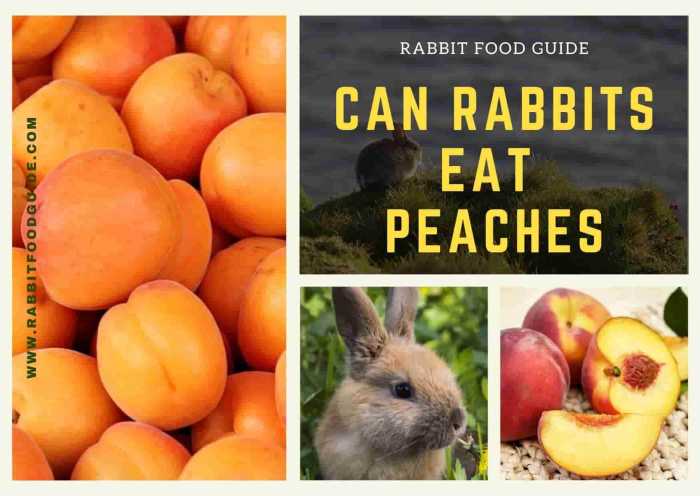Peaches, with their juicy sweetness, are a summer delight for many. But can our furry friends, rabbits, partake in this delectable treat? This comprehensive guide will delve into the nutritional benefits and potential risks of feeding peaches to rabbits, providing you with the knowledge to make informed decisions about your pet’s diet.
Rabbits, known for their sensitive digestive systems, require a specific diet to maintain optimal health. Understanding the nutritional composition of peaches and their impact on rabbits is crucial for responsible pet ownership.
Nutritional Benefits
Peaches are a nutritious fruit that can provide several health benefits for rabbits. They are a good source of vitamins, minerals, and fiber, all of which are essential for a healthy diet.
The following table provides nutritional information for peaches, per 100 grams:
| Nutrient | Amount |
|---|---|
| Calories | 39 |
| Carbohydrates | 9.5 grams |
| Protein | 0.9 grams |
| Fat | 0.2 grams |
| Fiber | 2.3 grams |
| Vitamin C | 9.9 milligrams |
| Vitamin A | 284 micrograms |
| Potassium | 180 milligrams |
| Calcium | 9 milligrams |
These nutrients are essential for a healthy diet for rabbits. Vitamin C is important for immune function and wound healing. Vitamin A is important for vision and skin health. Potassium is important for maintaining fluid balance and blood pressure. Calcium is important for bone health and muscle function.
Fiber is important for digestive health.
Vitamins
Peaches are a good source of vitamins, including vitamin C, vitamin A, and potassium. Vitamin C is an important antioxidant that helps protect cells from damage. Vitamin A is important for vision and immune function. Potassium is an important mineral that helps regulate fluid balance and blood pressure.
Minerals
Peaches are also a good source of minerals, including calcium and phosphorus. Calcium is an important mineral that helps strengthen bones and teeth. Phosphorus is an important mineral that helps the body use energy and repair tissues.
Fiber
Peaches are a good source of fiber, which is important for digestive health. Fiber helps to regulate the digestive system and prevent constipation. It can also help to lower cholesterol levels and reduce the risk of heart disease.
Potential Health Risks
Peaches, while generally safe for rabbits in moderation, can pose certain health risks if fed in excess or without proper preparation.
Gastrointestinal Issues
Rabbits have sensitive digestive systems, and consuming large amounts of peaches can lead to gastrointestinal upset. The high fiber content in peaches can cause bloating, gas, and diarrhea. Additionally, the sugar content can further exacerbate these issues, leading to discomfort and dehydration.
Sugar Content
Peaches are relatively high in sugar, which can be detrimental to rabbits’ health. Excessive sugar intake can contribute to weight gain, dental problems, and other metabolic issues. Rabbits’ diets should primarily consist of hay, vegetables, and a limited amount of pellets, with treats like peaches offered sparingly.
Safe Feeding Guidelines
Feeding peaches to rabbits requires moderation to prevent digestive issues. Follow these guidelines to ensure safe consumption:
Frequency: Limit peaches to 1-2 small slices per week.
Quantity: Each slice should be no larger than a quarter of a peach.
Avoid Overfeeding: Overindulgence can lead to digestive upset, diarrhea, and other health problems.
Alternative Fruits

Besides peaches, there are several other fruits that are safe and nutritious for rabbits. These fruits offer a variety of vitamins, minerals, and antioxidants, making them valuable additions to a rabbit’s diet.
Nutritional Differences
Alternative fruits have varying nutritional profiles compared to peaches. While they may not provide the same exact nutrient composition, they offer a range of essential nutrients. For instance, berries are particularly rich in antioxidants, while apples are a good source of fiber and vitamin C.
Safe Fruit Options
Here’s a list of alternative fruits that are safe for rabbits to eat:
- Berries (strawberries, blueberries, raspberries)
- Apples (seedless)
- Bananas (small amounts)
- Pears
- Apricots
It’s important to introduce new fruits gradually and in moderation, as excessive consumption can lead to digestive issues. Always remove any seeds or pits before offering fruits to rabbits.
Last Recap
In conclusion, while peaches can provide occasional nutritional benefits for rabbits, moderation is key. Overindulgence can lead to digestive issues and weight gain. By following the safe feeding guidelines Artikeld in this guide, you can ensure that your rabbit enjoys the occasional sweet treat without compromising their well-being.
FAQ Section
Can rabbits eat peach skin?
While peach skin is safe for rabbits to consume, it is important to wash it thoroughly to remove any pesticides or chemicals.
Can rabbits eat peach pits?
No, peach pits contain amygdalin, a compound that can release cyanide when ingested. They are toxic to rabbits and should never be given.
How often can rabbits eat peaches?
Peaches should be fed to rabbits sparingly, no more than once or twice a week as a treat. Overfeeding can lead to digestive upset.